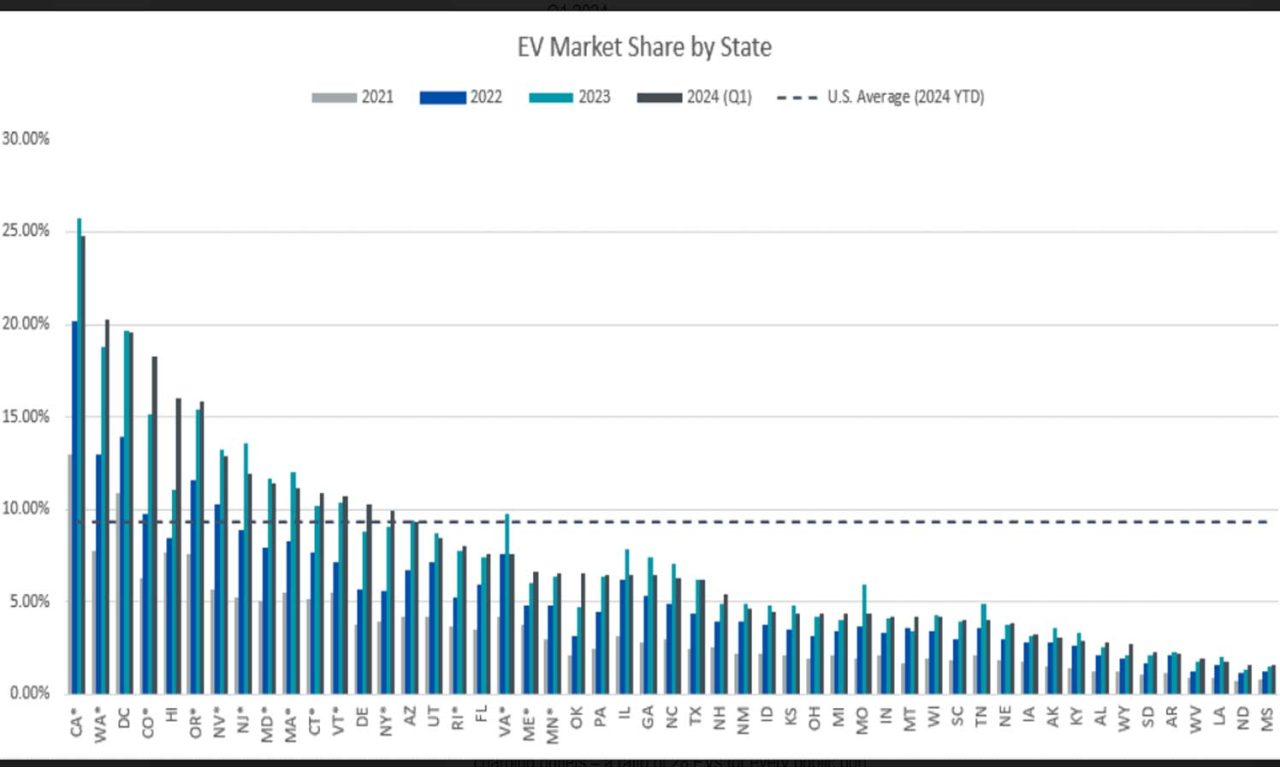
The quest to fundamentally transform the automotive industry by pushing electric vehicles into the market through regulations and billions in federal spending appears to be floundering.
According to a new report from Alliance for Automotive Innovation, Alaska now has 3,492 total electric vehicles (EV) on the road, with 119 publicly available charging outlets. That amounts to 29 EVs for every public port.
The data was compiled for the first quarter of 2024. It showed that EVs comprise 3.1% of all new light-duty vehicles sales in Alaska. That’s down from 3.8% in Q4 of 2023, and 4% in Q1 of 2023.
Nationally, EVs represented 9.3% of new light-duty vehicle sales in the first quarter of 2024 – down from 10.2% from the Q4 2023, but up from 8.6% in Q1 2023.
In Q1 of 2024, there were 208 EVs sold in Alaska. In terms of EV market share, Alaska ranks 42nd nationally.
Across the country, there were 4.7 million EVs on the road in Q1 of 2024 and a total of 167,213 publicly available charging outlets – a ratio of 28 EVs for every public port, which often leads to long wait times to charge cars.

While the Biden administration recently announce that it is dumping another $2 billion into its quest to boost the EV market, it remains an open question as to whether this effort will succeed. According to a recent report from Gallup, 7% of Americans say they own an electric vehicle (EV), but fewer and fewer are seriously considering buying one.
The Gallup report found that the number of Americans who are “seriously thinking” about getting an EV is trending down – from 12% in 2023 to 9% as of March 2024.
Public perception of EVs is also evolving. Once billed as a critical key for advancing the Green agenda, new data on EV manufacturing and battery disposal reveals that they also cause serious negative threats to the environment.
Weaking consumer demand for EV’s has forced the Biden administration to pursue a less-aggressive schedule of emission-reduction targets for auto companies. He had hoped that by 2030, 60% of new vehicle production would consist of EVs. That appears unachievable given consumer preferences.
Based off data from a December 2023 report by Chugach Electric, EV cars comprise less than 1% of all vehicles in the state.
EV owners, however, face real-world challenges in keeping their cars properly charged, especially in the winter.
ALASKA WATCHMAN DIRECT TO YOUR INBOX
The Chugach report notes that Battery Electric Vehicles (BEV) run solely on battery electricity, commonly with a range of 200-350 miles or more. Plug-in Hybrid Electric Vehicles (PHEV) have a smaller battery and modest all-electric range (often 25-40 miles) as well as an internal combustion drivetrain.
EV range, however, is significantly compromised in cold weather with efficiency dropping 20-30% in winter months as more of the battery is used for cabin heat.
Gallup concluded that the U.S. market for EV’s is “fairly limited” and relatively static.
“Unless that market expands greatly in the next few years, it is unlikely auto companies doing business in the U.S. will be able to meet the emissions targets laid out by the Biden administration,” Gallup observed. “Those targets may need to be relaxed further if Biden is reelected, or they may be done away with under a second Trump administration.”








9 Comments
I suspect that most of Alaskans who own EVs also own a regular gasoline-powered vehicle. Yes, very cold weather can be problematic for EVs, but I have yet to meet a Tesla driver who regretted his purchase. Scandinavian countries have been leaders in electric vehicle (EV) adoption in Europe, with some countries seeing more than half of new car sales being electric in a given month, despite having colder climates. But this may also have to do with the fact that Europeans pay MUCH higher prices for gasoline than Americans.
All of these EV car owners are, the ones stopping oil drilling, mining and save the fish.
Vote Trump to stop all these lies, that the left is pushing, windmills, climate change etc
Remember when accusations used to fly about narrower tires causing ruts on the roads? Well, now we have tiny cars that are heavier then their gas counter-parts that are going to cause even more damage to the roads then our gas-powered vehicles. Nothing makes sense about those EV’s existence.
R you certain it’s not Growth?
This article is ignorant of the main points. Some of the comments are even worse. The vast majority of charging does not take place at paid, public charging stations. I have only charged my EV at such stations three times. I have never had anything even close to a long wait. 2 of the 3 times there was no wait at all. As for the other ignorant comments, I am extremely conservative. I worked up on the slope as an electrician. I love gas powered vehicles. I love ElectricVehicles. They are fun and they are very cheap to operate, especially for me. That’s it.
If you want to change things, get rid of the increasingly ridiculous CAFE standards. That will drive this industry no matter what you do.
But you who irrationally hate EVs driven by those who freely chose them and enjoy them can take sola e in the fact that the grid cannot handle all road vehicles being electric. The entire power production of the US would have to almost quadruple.
Is the USA the only nation that doesn’t understand that EVs are already an obsolete technology? Asian automakers have already figured out that hydrogen fuel cell vehicles are by far more efficient, less expensive and easier to resource, less expensive to operate, less of an impact on the environment and climate “footprint”, and safer to own and drive. The Obama administration banned hydrogen fuel cell vehicles in the USA, committing us to a technology already made obsolete by HVs, a commitment costing Americans billions, possibly trillions of dollars .on supporting infrastructure. Why? That needs to be investigated. Are the MSM and “journalists” sleeping? Or are they complicit with a govt they look to as their almighty god?
Wrong
If, or when, the brown outs start occurring, we know where to look for the cause; 3,492 electric vehicles.
I’m no electrical expert but I do know those things require significant amounts of power. The average Tesla uses 34 kWh of electricity per 100 miles. Average home in the US uses 893 kWh per month.
Two questions
Does the owner of a EV pay road tax?
And does the EV owner get free charging when they live on a Military Installation?